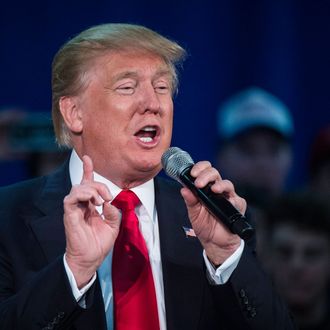
For all that remains unknown in the GOP primary — who will win the final 16 states and by what margins; where the true loyalties of the actual delegates in Cleveland will lie; what novel vulgarities will drop from the front-runner’s gaffe-hole — the basic endgame appears all but certain. Donald Trump will almost definitely enter the convention without a majority of pledged delegates, but with far more than anybody else.
At the moment, Trump leads Ted Cruz by roughly 200 delegates. If current polling holds up, that advantage will increase substantially in the coming weeks, as a series of northeastern states cast their ballots. But next month, the primary will return to the West, where Cruz has typically outperformed the mogul. And as a result of the incompetence of his delegate-wooing operation, the Donald’s path to a pre-convention majority has narrowed into a tightrope in recent days. Meanwhile, Ted Cruz has been so dominant in the delegate selection process, the Washington Post reports he will likely pick up at least 130 votes in the event of a second ballot — nearly enough to make a Trump victory impossible, barring a fundamental change in the mood of other unbound delegates.
Weeks ago, FiveThirtyEight asked a panel of experts to project the number of delegates Trump was likely to win in the remaining primary contests. The consensus projection put Trump on pace to come just short of a majority. Since then, Trump has underperformed that model, winning significantly fewer delegates in Wisconsin and Colorado than initially projected — in the latter state, Trump was shut out entirely. Making matters worse, recent polling of California suggests the Golden State will not give Trump the landslide he’ll need on June 7 to clinch the nomination before Cleveland.
At this point, Trump probably can’t make an Establishment coup mathematically impossible. And so he’s doing everything in his power to make it politically impossible.
“The system is rigged, it’s crooked,” Trump lamented on Fox News Monday. Over the weekend, Cruz secured every delegate in Colorado by out-organizing Trump at the Rocky Mountain State’s series of party conventions. Colorado allocates its delegates according to the consensus of those conventions, rather than through a primary vote.
“We thought we were having an election, and a number of months ago they decided to do it by you know what, right? They said we’ll do it by delegate,” Trump complained at a rally in Albany Monday night. “So it’s a crooked, crooked system.” Trump reiterated his complaint on Tuesday, telling CNN that the Republican National Committee does not want him to win, because they “don’t have any control of me because I’m working for the people.”
Cruz, along with RNC chair Reince Priebus and most of the punditocracy, interpreted Trump’s rants as sour grapes. And, on one level, they clearly are. The fact that Trump did not understand all of the rules governing the GOP primary contest does not make that contest “crooked.” And to the extent that delegate rules are undemocratic, they’ve actually been undemocratic in Trump’s favor: If delegates were allocated in strict proportion to one’s share of the popular vote, the Donald would be in a far worse position than he is today.
But it doesn’t really matter whether Trump has good reason to feel cheated — what matters is that his supporters think he does. The more Trump can stoke the sense that he’s been victimized by a corrupt Establishment, the more politically difficult it will be for the party to deny him the nomination on a first ballot. Republican National Committee member Ryan Evans seemed to gesture toward that difficulty Wednesday, telling MSNBC that if Trump enters the convention with 1,100 pledged delegates — 137 short of a majority — he will become the nominee.
Trump and his allies have hinted at audacious ways of making matters even more difficult for the Donald’s foes. Last month, the mogul predicted his supporters would riot if he were turned back at the convention. Last week, longtime Trump ally Roger Stone vowed that he would direct enraged Trump supporters to the hotel rooms of any delegate that defied the Donald’s will.
But such incitement may be unnecessary. A majority of Republican voters already believe that Trump should receive the nomination if he enters the convention with a plurality of delegates. As Politico notes, a CNN/ORC poll released last month showed that roughly two-thirds of Republicans would feel either “enthusiastic” or “satisfied” about a Trump nomination. The Donald is less popular than a typical front-runner, but he isn’t nearly as reviled — at least, among Republicans — as the #NeverTrump crowd would have you believe.
And that’s a big problem for anyone who doesn’t want the party of Lincoln to nominate a proto-fascist reality star. There would be nothing “crooked” about GOP delegates thwarting Trump’s nomination on a second ballot. The rules are what they are. But the Republican electorate is what it is — a group of voters that prefers Trump above any of his alternatives and one that has never seen a front-runner rejected by a convention. Should the confetti rain down on someone else this summer, a portion of that electorate will see Trump as a martyr felled by an illegitimate party.
In the coming months, Trump will work hard to grow that portion. His rants about the “rigged, crooked” system aren’t merely the frustrated ravings of a lifelong brat. They are also the foundations of an argument about what makes a nominating process “fair.” At this point, winning that argument may be just as important for the front-runner as winning primaries.






























